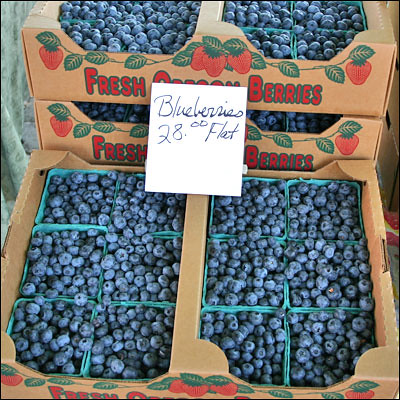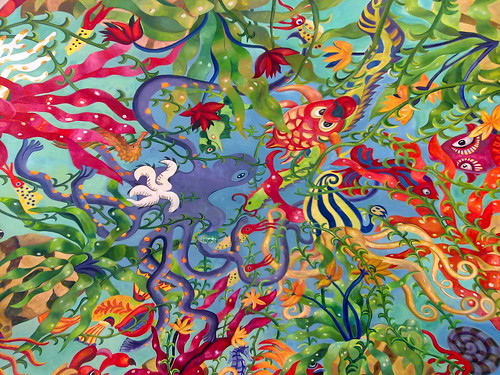This weekend, I'm quite delighted to introduce a fabulous writer and instructor, Maribeth Fischer. I've had the pleasure of participating in a couple of Maribeth's workshops, and I always walked away with brewing poems and more insight on writing. This weekend's creative writing prompt puts you on a mission, so as you explore with the list she will ask you to start, I am requesting that you please share part of your lists in the comments section this weekend because we would love to read them. Thanks so much and enjoy your writing time!
********************************************
Exercise: Finding Orange by Maribeth Fischer
Orange was my nephew Sam’s favorite color, though I didn’t know this until after
he died just before his eighth birthday. Vaguely, I recall that when he needed hearing aids
at age five or six and could choose any color, he choose orange….At least I think he did.
Maybe it was purple, another favorite color; maybe one of each. I know, too, that in one
of my favorite photographs of Sam, taken on his seventh birthday, he’s wearing a bright
orange Buzz Lightyear Hawaiian shirt.
But not until his funeral do I recall actually knowing for a fact that Sam’s favorite
color was orange. I remember how the men—his dad and my brothers, Sam’s uncles--
wore orange ties with their dark suits. I remember too, how in the days before that awful
March morning when we buried him, my mother and I frantically drove from one art
supply store to the next looking for orange foam core to make storyboards of Sam’s life.
Mostly, I remember how after the funeral service, we released 200 orange balloons into
the grey Wisconsin sky.
In the months after Sam died, I began noticing orange everywhere: someone’s
orange t-shirt or the orange highway cones at a construction site; an orange moving
van, an orange silk dress in a shop window, the orange front door of a stranger’s house.
And then I began actively searching for orange, taking photographs of my discoveries. I
pulled over along a narrow two-lane highway one morning, cars honking as they swerved
by, to take a picture of a rusted orange mailbox in the rain. Another night, through the
windshield, I photographed a peach-colored sky. I stood in front of a children’s boutique
another day to snap a photo of a pair of toddler’s orange and white striped socks pinned
to a clothesline in the window. In traffic, I sped through yellow lights to catch up with a
bright orange VW or a truck with an orange license plate. I walked the beach, camera in
hand, and spotted orange beach umbrellas, sand buckets and beach chairs, and once, an
obese man in orange swim trunks. I collected shells with vivid orange markings on their
interiors, noticed that the entire side of a restaurant on the main street of my town was
painted bright orange!
Friends began giving me orange gifts: soup bowls, bath towels, pillowcases,
frying pans, wine glasses and earrings. Orange running shorts and running shoes, nail
polish, a small table, a wrist watch, an orange Cross pen, orange desk calendar, and from
my friend Gail, a Murano glass ring from Italy that for a year, I wore everyday on my
wedding ring finger. Even now, nearly six years since Sam died, when the man I love,
a man who never knew Sam, gives me a motorcycle helmet for my birthday, he spends
weeks searching for one with an orange stripe down its center. That orange stripe is what
makes the gift unique and meaningful and what makes the helmet—for a woman who
never rode a motorcycle before meeting this man—absolutely perfect. The orange stripe
tells me that this man loves me, that he pays attention to what makes me happy. In fact,
the real gift for me isn’t the helmet but the detail of that orange stripe across its top.
But what does any of this have to do with writing?
A lot.
Maybe everything
Especially if you understand that writing is about looking hard at what has
surrounded you perhaps your whole life and finally, finally noticing it. And not just
noticing it, but finding the meaning in it, and the beauty. As the poet W.S. Merwin once
said, “A poem results from a sudden awakening of attention.
For me the color orange is a poem.
A rusted mailbox in the rain.
EXERCISE: Pick a color that means something to you: It could be your favorite
color or the favorite color of someone you love or even a color you don’t like at all.
Start searching for this color. Every day. Right now: Wherever you are sitting, find ten
examples of this color. Do this for a week. Ten examples a day for seven days. Don’t list
the same example twice. And be picky. Try to make yours a list that no one but you could
have created. This might involve searching for the color. Going to new places. Taking
walks. Driving home a different way.
If your color is red, for instance, then noticing apples in the grocery store isn’t
really paying attention. Any one can find this example. Easily. Your goal is to notice the
surprising reds, the reds that appear when you don’t expect them.
Right now, I am sitting in a Starbucks and I am trying to notice the reds and yes, I
see the stop sign at the end of the parking lot (pretty typical) and the bright red “Mattress
Discounter” sign on the building across the street (more specific, but kind of ho hum),
and the red car (a dime a dozen) that just pulled into the lot, the red taillights of the cars,
the red Exit sign over the door…all kind of generic. But at least I am noticing things (
I wouldn’t have seen any of this had I not forced myself to pay attention. I hadn’t seen
any of these things, in fact, though I’ve been coming to this Starbucks for years). Then
I notice the knot of the blue-and-red striped tie of the man sitting nearby. He’s wearing
a gray sweater-vest and the tie disappears into the vest, so the triangle-shaped knot--
comprised mostly of the red stripe across its center--is all I see.
Two days have now passed since I wrote the above description, but I can still picture that man…not just his tie, but his grey sweater vest, his pink oxford shirt, his narrow face and silvery–gray hair (almost the same color as his vest) cropped short. This is part of the joy of noticing: you think you are just focused on one detail, but that single detail will gives you an entire picture.
Again, to quote W.S. Merwin: “IF you could get one moment right, it would tell you the whole
thing” he said in an interview. “And that’s true of your own life—each moment is absolutely
separate and unique, and yet it contains your entire life.”
So it is with details.
And this, in a nutshell, is what the best writing is about: finding the exact detail that
allows us to see a world we couldn’t have otherwise.
So seven days. Ten objects a day. This is not as easy as it sounds. In fact, it should
be a challenge. Keep in mind that if it’s easy to find your ten objects, chances are that
you are finding generic examples as opposed to specific examples that are unique to you.
Remember: The search is as important, perhaps more important, as what you
actually find.
***************************************************************************************
Maribeth Fischer's first novel, The Language of Goodbye, was awarded Virginia
Commonwealth University's First Novel Award for 2002. Fischer’s second novel, The
Life You Longed For, chosen as an April 2007 BookSense Notable Book, as well as a
alternate book selection the Literary Guild. Currently it has been released in five foreign
countries.
Fischer’s literary essays have appeared in such journals as The Iowa Review and The Yale
Review, and have twice been cited as notable in Robert Atwan's Best American Essays.
She has also received a Pushcart Prize for her essay Stillborn, as well as a Smart Family
Prize for her essay Lottery.
Currently, Fischer lives in Rehoboth Beach, Delaware. In addition to founding the
Rehoboth Beach Writers’ Guild and serving as executive director of the Writers At The
Beach: Pure Sea Glass writing conference, which over 5 years raised and donated over
$65,000 to mitochondrial disease research in her nephews’ names, Fischer teaches
workshops in writing. She also speaks at medical conferences and to healthcare workers
about writing.








